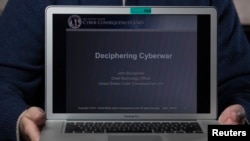ທີ່ມາຂອງຄວາມສົງໄສໃນການໂຈມຕີຄອມພີວເຕີ ທີ່ລົບກວນໜັງສືພິມ ລອສ ແອເຈີ
ລິສທາຍມ໌ ແລະການບໍລິການຂອງໜັງສືພິມທຣິບຸນ ຍັງບໍ່ເປັນທີ່ແຈ່ມແຈ້ງໃນວັນອາ
ທິດວານນີ້ ຫຼັງຈາກໄດ້ເຮັດໃຫ້ການພິມເຜີຍແຜ່ລ້າຊ້າ ແລະນຳມາຊຶ່ງຄວາມສົນໃຈ
ໃນການສືບສວນຂອງລັດຖະບານກາງ.
ຜູ້ພິມເຜີຍແຜ່ສະຫະພັນທຣິບຸນແຊນດີເອໂກ ທ່ານແຈັຟ ໄລຕ໌ ໄດ້ອະທິບາຍເຖິງເຫດ
ການດັ່ງກ່າວວ່າ “ອັນທີ່ເຫັນຢູ່ໃນປະຈຸບັນນີ້ປາກົດວ່າເປັນການໂຈມຕີທີ່ຮ້າຍແຮງຕໍ່
ບໍລິສັດ ໂດຍພວກທັບມ້າງຄອມພິວເຕີ” ທີ່ກ່າວເຜີຍແຜ່ຢູ່ໃນໜ້າເວັບໄຊຂອງໜັງສື
ພິມ. ທ່ານໄດ້ກ່າວຕໍ່ບັນດາຜູ້ອ່ານວ່າ ການລົບກວນສ່ວນໃຫຍ່ ປາກົດວ່າໄດ້ນຳມາ
ສູ່ພາບຄວບຄຸມໄດ້ແລ້ວ.
ການໂຈມຕີທີ່ຖືກສົງໄສນັ້ນ ໄດ້ປ້ອງກັນບໍ່ໃຫ້ໜັງສືພິມຊິຄາໂກທຣີບຸນ ບາລຕິມໍຊັນ
ແລະໜັງສືພິມອື່ນໆບໍ່ໃຫ້ພິມເຜີຍແຜ່ປະກາດການຕາຍທີ່ຈ່າຍເງິນ ແລະການໂຄສະ
ນາໃນວັນເສົາຜ່ານມາ. ແຕ່ການພິມເຜີຍແຜ່ຂອງໜັງສືພິມທຣິບຸນໄດ້ກ່າວວ່າ ບໍ່ມີ
ຂ່າວໃນໜ້າເວັບໄຊ ໄດ້ຖືກກະທົບ ແລະຂໍ້ມູນຂອງລູກຄ້າບໍ່ໄດ້ຮັບຄວາມເສຍຫາຍ.
ທ່ານນາງເຄຕີ ວາລດແມນ ໂຄສົກກະຊວງຮັກສາຄວາມປອດໄພພາຍໃນ ກ່າວຢູ່
ໃນອີແມລໃນວັນອາທິດວານນີ້ວ່າ ອົງການໄດ້ “ຊາບເຖິງລາຍງານກ່ຽວກັບ ເຫດ
ການທາງຄອມພິວເຕີ” ທີ່ເປັນຜົນກະທົບຕໍ່ຫຼາຍແຫລ່ງຂ່າວ. ທ່ານນາງກ່າວວ່າ
ທາງກະຊວງ “ກຳລັງເຮັດວຽກກັບລັດຖະບານ ແລະບັນດາເພື່ອນຮ່ວມງານ ອຸດ
ສາຫະກຳ ເພື່ອໃຫ້ເຂົ້າໃຈສະພາບການໃຫ້ດີຂຶ້ນ.
ໜັງສືພິມລອສແອລເຈີລິສທ່າມ ໄດ້ໃຫ້ຂໍ້ສັງເກດວ່າ “ສ່ວນບຸກຄົນຈຳນວນນຶ່ງທີ່
ຮູ້ກ່ຽວກັບສະພາບການຂອງໜັງສືພິມທຣີບຸນ” ໄດ້ລາຍງານວ່າ ການໂຈມຕີປາກົດ
ວ່າຢູ່ໃນຮູບແບບຂອງ “ຣີຢຸກ” ທີ່ເປັນການຮຽກຄ່າໄຖ່. ຜູ້ເຜີຍແຜ່ທຣິບຸນໄດ້ຂາຍ
ໜັງສືພິມລອສແອລເຈີລິສທາຍມ໌ ແລະສະຫະພັນທຣິບຸນແຊນດີເອໂກ ໃນຕົ້ນປີນີ້
500 ລ້ານໂດລາແກ່ມະຫາເສດຖີ ໄບໂອເທັກ ດຣ. ແພຕຣິກ ຊູນ-ຊິອົງ ແຕ່ວ່າບໍລິ
ສັດຍັງດຳເນີນແບ່ງປັນຊອຟແວລກັນຢູ່ ອີງຕາມໜັງສືພິມດັ່ງກ່າວ.
ການແນະນຳໂດຍກະຊວງອະນາໄມ ແລະສັງຄົມສົງເຄາະ ໂຄງການຮັກສາຄວາມ
ປອດໄພຄອມພິມເຕີໃນຕົ້ນປີນີ້ໄດ້ອະທິບາຍວ່າການໂຈມຕີ “ຣີຢຸກ” ວ່າເປັນ “ເປັນເປົ້າໝາຍສູງຂອງການໂຈມຕີ ມີຊັບພະຍາກອນທີ່ດີ ແລະວາງແຜນດີ.”
The origins of a suspected computer attack that disrupted the Los Angeles Times and Tribune Publishing newspapers remained unclear Sunday after causing delivery delays and being brought to the attention of federal investigators.
San Diego Union-Tribune Publisher Jeff Light described the incident as ``what now seems to have been a malicious attack on the company by computer hackers'' in a message posted to the newspaper's website. He told readers the disruption had mostly seemed to have been brought under control.
The suspected attack prevented the Chicago Tribune, the Baltimore Sun and other papers from publishing paid death notices and classified ads Saturday. But Tribune Publishing has said no news websites were affected and no customer information was compromised.
Katie Waldman, a spokeswoman for the Department of Homeland Security, said in an email Sunday that the agency was ``aware of reports of a potential cyber incident'' affecting several news outlets. She said the department is ``working with our government and industry partners to better understand the situation.''
The Los Angeles Times, citing ``several individuals with knowledge of the Tribune situation,'' reported that the attack appeared to be in the form of ``Ryuk'' ransomware. Tribune Publishing sold the Los Angeles Times and the San Diego Union-Tribune earlier this year for $500 million to biotech billionaire Dr. Patrick Soon-Shiong, but the companies continue to share software, according to the newspaper.
An advisory by the U.S. Department of Health and Human Services' cybersecurity program earlier this year described ``Ryuk'' attacks as ``highly-targeted, well-resourced and planned.''
Mark Weatherford, a former DHS deputy under secretary for cybersecurity who is now chief cybersecurity strategist at California-based vArmour, said Sunday that phishing links are the most common way such attacks gain entry.
``It's fairly non-discriminatory. This could happen to anybody, although it seems to be more of a targeted attack,'' Weatherford said. He added, however, that it was too early to draw conclusions.
Tribune Publishing also reported the attack to the FBI on Friday, the Chicago Tribune said. The FBI did not immediately return a message seeking comment Sunday.





